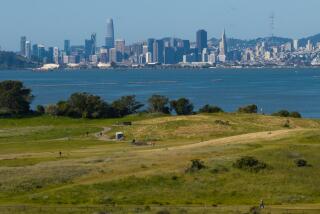Mayors’ Panel Against N-Waste Shipping
- Share via
MADISON, Wis. — A committee of mayors voted Saturday to oppose transporting high-level nuclear waste to a national repository unless federal officials can guarantee the safety of all cities along proposed routes.
The resolution adopted on a unanimous voice vote stopped short of opposing the creation of a nuclear waste repository in Nevada’s Yucca Mountain. Three Western mayors had urged their counterparts earlier in the day to oppose the repository, saying that shipping radioactive waste to the site would threaten the entire country.
Las Vegas Mayor Oscar Goodman said an earthquake centered 12.5 miles from the proposed site at Yucca Mountain on Friday reinforced his concern that the site was unsafe for storing nuclear waste.
“That’s our problem,” Goodman told the U.S. Conference of Mayors. “The nation, however, has a problem with transportation.”
Goodman, Salt Lake City Mayor Rocky Anderson and Reno Mayor Jeff Griffin said the federal government had not done enough to study the risks posed by shipping nuclear waste to the proposed site by highway or rail.
The federal plan would bury 77,000 tons of nuclear waste in tunnels inside Yucca Mountain, where it would remain radioactive for more than 10,000 years. The House has already approved the plan; the Senate has to vote on it by July 26.
The conference energy committee’s resolution calls on Congress to prohibit moving high-level nuclear waste until cities along its route have adequate funding, training and equipment in the event of an accident. The full conference was expected to vote on the resolution Monday.
The conference, which drew about 250 mayors, includes a series of meetings on issues ranging from affordable housing to the environment.
The mayors also approved a resolution urging Washington to distribute homeland security block grants directly to cities and counties. President Bush has proposed sending about $3.5 billion in such grants to states, with three-quarters of it targeted for local governments.
“There should be no middlemen. It should go directly to the cities,” said Boston Mayor Thomas Menino, a Democrat who is president of the group.
Health and Human Services Secretary Tommy G. Thompson told the mayors that distributing money through the states is the quickest way.
He noted that before states could receive the money their plans for spending it had to be approved by the federal government.
“If we had to do this with all of the cities, we probably wouldn’t have been able to do it,” said Thompson, who was governor of Wisconsin for 14 years.
A survey of 122 mayors found that three-fourths were concerned about the threat of a chemical or biological attack, and almost 4 out of 5 said they had inadequate funding to detect threats.
Three out of four said they do not have enough money for emergency response equipment or programs to protect city infrastructure.
Also scheduled to speak at the conference, which started Friday, are Homeland Security Director Tom Ridge and Federal Emergency Management Agency Director Joe Allbaugh.
The mayors met under tight security, with the city closing nearby streets as well as the shore of Lake Monona that borders the convention center.
More to Read
Sign up for Essential California
The most important California stories and recommendations in your inbox every morning.
You may occasionally receive promotional content from the Los Angeles Times.










